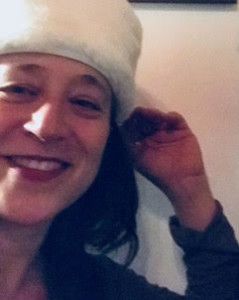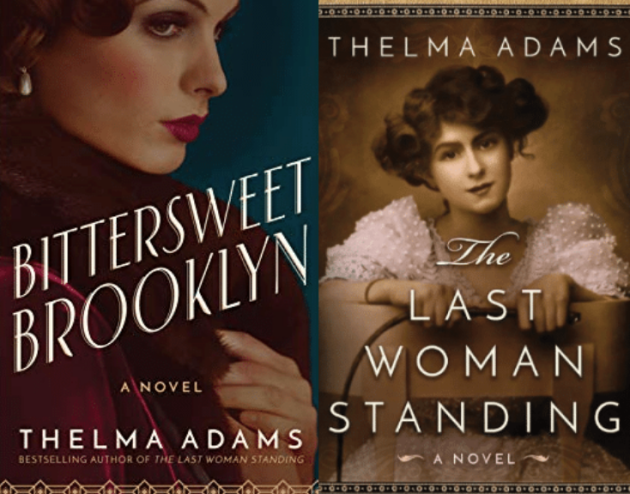The Lilith Blog
August 8, 2019 by admin
Toni Morrison Gave Me Permission to Be a Mother and a Novelist
During this week of tributes to Toni Morrison, I’ve written elsewhere about my gratitude for ways Morrison opened the windows of my writing life. I had the good fortune to study with Morrison in college, and she served as my advisor for my senior thesis. Toni Morrison was the first person to encourage me to write about my own background, essentially giving me the permission I was hesitant to give myself to write about my Holocaust-survivor family’s stories. I had the privilege of her advice and support as I took the first steps of learning how to grapple with history on the page.
As if that weren’t gift enough, there was yet another sort of permission she offered, though I didn’t feel its impact until years after I’d graduated.
- 1 Comment
August 7, 2019 by Aileen Jacobson
The Extraordinary Bravery and Short Life of Hannah Senesh Come to Life in the Revival of a Valuable Play
By all rights, Hannah Senesh should be as widely known and beloved as Anne Frank. Both were young Jewish women who confided their dreams and struggles during the Holocaust to their diaries in bright and sharply observed entries. Both their stories are moving and inspiring, revealing a steadfast spirit and a lively intelligence.
Some people may know her poems, one of which—”Eli, Eli,” has become a poignant liturgical standard. Some may remember Senesh’s story of extraordinary courage, and now more people will, thanks to a play that just opened at the Museum of Jewish Heritage in New York. “Hannah Senesh,” which includes music, dance and songs based on poems Senesh wrote, brings the young idealist to urgent life.
She emigrated from her native Hungary to Palestine in 1939 and, a few years later, volunteered to parachute behind Nazi lines to save other Jews, an arduous and dangerous venture. She was part of a Jewish contingent in a larger British plan to rescue downed English fighter pilots, after which the Jews could attempt their own rescues.
In the play, we first meet Hannah at age 13 and stay with her during the next decade of her eventful life. She starts out as a giddy teenager, announcing she’s a vegetarian as she waves around a stick of celery and tries to figure out how to modify the frilly pink party dress her mother has bought her so that it is more to her liking.
- No Comments
August 6, 2019 by Steph Black
Escorting at an Abortion Clinic is Praying with My Feet
I often come up against a presumption by those on the left that being religious and politically progressive are incongruous But the fight for reproductive freedom and the Jewish values by which I choose to live my life are one and the same. These values have spurred me into action. Recently, I officially became a trained clinic escort with the Washington Area Clinic Defense Task Force because of my Jewish values.
Clinic escorting, also called clinic defending, is the act of guiding patients from their vehicles and into a clinic that provides abortion care. But escorts also serve as the eyes and ears of a clinic: keeping a lookout for suspicious activity, watching for anti-choicers breaking the law or trespassing, and signaling to the world that we will not be intimidated, bullied, or harassed out of providing care for those who want it. On some days, clinics can face crowds upwards of hundreds of protestors.
- No Comments
August 1, 2019 by Eleanor J. Bader
Making “Black Hat”: Director Sarah Smith Tells All
As a Lutheran growing up in Minnesota, Sarah Smith had no way to anticipate that she would one day direct a film about a gay-curious Hasidic man living in Los Angeles. But her award-winning film,” “Black Hat” zeroes in on Shmuel [played by Adam Silver], a married father, whose wife and kids are visiting out-of-state relatives. Suddenly footloose, the devoutly observant Shmuel allows himself a brief foray into gay L.A. where he meets Jay [Sebastian Velmont], a man who lives without the constraints of community expectations. What ensues is tender, provocative, and open-ended, a tiny glimpse into a world that is all-too-often exoticized and ridiculed. In a short 14 minutes, the film—written by Phillip Guttmann, produced by Yaniv Rokah, and co-produced by Loriel Samaras and Guttmann—tells a compelling and fresh story. Eleanor J. Bader spoke to Sarah Smith by phone in June.
Eleanor J. Bader: Were you familiar with ultra-Orthodox or Hasidic Jews before directing “Black Hat”?
Sarah Smith: I first came to New York from a suburb of Minneapolis to attend New York University and stayed in the City for nine years. At first, I felt some culture shock, but by the time I directed the film, I had familiarity with the community. From 2002 to 2006, I worked as a writers’ assistant at the now-closed JC Studios in the Midwood section of Brooklyn. While there, I’d encountered many Hasidic and Orthodox people and had learned a little bit about them.
EJB: A number of recent feature films have introduced Hasidic life to mainstream audiences. How does “Black Hat” fit into this genre?
SS: There are a range of films about Hasidim. Some condemn the community and others just tell a story. Disobedience falls into this latter category.
- No Comments
July 29, 2019 by admin
How I Got My Town to Offer Free Menstrual Products
This article was originally published on Jewish Women, Amplified, the blog of the Jewish Women’s Archive.
Last year when I was a senior at Brookline High School, I wrote an op-ed in the student-run newspaper about the stigma and cultural shame surrounding menstruation in our society. The article caught the attention of local legislator Rebecca Stone, who took action to combat some of the concerns I voiced in the piece. This past May, Brookline became the first municipality in the country to provide free menstrual products in every public restroom.
Ms. Stone’s response to my original article, as well as the public support for the (now passed) warrant, goes beyond anything I could have imagined. Among many things, this experience has renewed my faith in the power of storytelling.
- No Comments
July 22, 2019 by admin
An Israeli Official Called My Family a “Second Holocaust” — and I Felt Relieved
In a recent meeting, the Israeli Minister of Education, Rafi Peretz, called my family part of “a second Holocaust.” According to three sources present, the new Netanyahu appointee told the Cabinet, in response to a presentation on demographic trends among American Jews, that the rate of intermarriage between Jews and non-Jews in the United States was the moral equivalent of our people’s greatest trauma in recent memory.
When I read his comment, I braced myself for a wave of indignation. Instead, I felt relief.
- 1 Comment
July 16, 2019 by Jamie Zabinsky
“Failed Self-Abortion With a Wire Hanger”: A Letter from a Namesake to an Ancestor
Dear Jennie,
Despite our shared name, your life and death were clarified for me only in college, when I started to develop a vocabulary for seeing the world through gender, power, class, suffering and solidarity. I began to realize that the way my family had passively glorified your story as one of dire poverty alone missed several crucial, intersecting points—your gender, the drive to control the female body, autonomy, motherhood, the value of a life, and the devastation of death and desperation. No one mentioned until recently, at least to my knowledge, that you likely struggled with depression. Me, too.
- 3 Comments
July 15, 2019 by Patricia Grossman
Jewish Blues Musician Elly Wininger Proves It’s Never Too Late
Elly Wininger, 2014 inductee into the NY Blues Hall of Fame, has a unique recording history among a group of versatile Jewish musicians who have wowed us with their blues singing and playing, like Mike Bloomfield of the Paul Butterfield Blues Band, Amy Winehouse, Dave Bromberg, and Bob Dylan. Even Bette Midler (“Long John Blues,” “Empty Bed Blues”) has dipped into the genre. Wininger went to her first audition at 16, was offered a recording contract, and forbidden from pursuing it by her mom. Five decades later, she’s finally been signed to a label, and she took a moment to talk to Lilith’s Patricia Grossman about her life as a singer and musician.
- 1 Comment
July 15, 2019 by Eleanor J. Bader
Belladonna Founder Rachel Levitsky on Poetry, Politics, and What Comes Next
Rachel Levitsky calls herself a “lesbian, commie, poet, and polemicist who makes things.” And she does: Levitsky has written three full-length books and nine chapbooks herself, teaches undergraduates, and is the founder of the Belladonna Collaborative, a 20-year-old feminist avant-garde literary salon and publisher of experimental, multi-gendered, and linguistically bold titles.
Among Belladonna’s releases are award-winning texts from writers including LaTasha N. Nevada Diggs (Whiting Award) and Beth Murray, whose posthumous book of poems, Cancer Angel, won the 2016 California Book Award. Levitsky sat down with Eleanor J. Bader in Belladonna’s office.
Eleanor J. Bader: Have you always been a poet?
Rachel Levitsky: When I was a child my dad told me not to be a poet. Writing poetry was not an occupation in the Levitsky consciousness. I did not come out as a poet until 1994.
 EJB: Do you know why your father had this attitude?
EJB: Do you know why your father had this attitude?
RL: My parents seemed to value invisibility. My mother had been born in Germany and came to the US as a toddler in December 1939. Her uncle survived Auschwitz, but no one in my family was willing to talk about any of this and I always wanted to know more.
EJB: Is this why you became interested in history?
RL: Maybe. I was a history major as an undergraduate at the State University of New York (SUNY) in Albany and got a Master’s in American Social History. My focus was labor. My thesis looked at the way the cigar industry in Binghamton, NY became segregated by gender.
EJB: But you chose to pursue activism.
RL: I wasn’t interested in pursuing further academic study in History. I plunged into activism in New York City, joining ACT-UP and WHAM!—Women’s Health Action and Mobilization.
My job at the time was with the Home Program of the Bond Street Homeless Center run by Catholic Charities. Every night, five of us would load into a van and drive around Brooklyn trying to convince mentally-ill, chemically-addicted people to come to the Center’s drop-in program.
I did this work in 1991 and 1992, until I got a job teaching adult basic education classes for the Consortium of Worker Education (CWE), an educational organization that serves union members. In 1993-94 I taught English in Mexico. When I came back to the US, I returned to the CWE and eventually got a full-time job running an English as a Second Language program at the Painters and Finishers Apprenticeship program in Long Island City.
- No Comments
July 10, 2019 by Yona Zeldis McDonough
A Novelist Brings Jewish Women to the Forefront of Crime Stories
 A Jewish woman married to Wyatt Earp? A Jewish woman cleaning up after a murder committed by her brother, a criminal with ties to the Jewish mafia? These are the kinds of stories that novelist Thelma Adams loves to tell.
A Jewish woman married to Wyatt Earp? A Jewish woman cleaning up after a murder committed by her brother, a criminal with ties to the Jewish mafia? These are the kinds of stories that novelist Thelma Adams loves to tell.
She talks to Fiction Editor Yona Zeldis McDonough about how she finds her subjects and what they yield in her novels.
- No Comments
 Please wait...
Please wait...